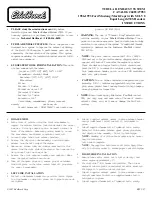
4
4
CORROSION PREVENTION AND APPEARANCE CARE
4
WASHING AND WAXING
E030A01GK-AAT
Washing Your Hyundai
Never wash your car when the surface
is hot from being in the sun. Always
wash your car in the shade.
Wash your car frequently. Dirt is abra-
sive and can scratch the paint if it is not
removed. Air pollution or acid rain may
damage the paint and trim through
chemical action if pollutants are al-
lowed to remain in contact with the
surface. If you live near the ocean or in
an area where road salts or dust con-
trol chemicals are used, you should
pay particular attention to the under-
side of the car. Start by rinsing the car
to remove dust and loose dirt. In win-
ter, or if you have driven through mud
or muddy water, be sure to thoroughly
clean the underside as well. Use a
hard direct stream of water to remove
accumulations of mud or corrosive
materials. High pressure car washes
may cause water to enter your vehicle.
Use a good quality car-washing solu-
tion and follow the manufacturer's di-
rections on the package. These are
available at your Hyundai dealer or
auto parts outlet. Don't use strong
household detergents, gasoline, strong
solvents or abrasive cleaning powders
as these may damage the finish.
Use a clean sponge or cloth, rinse it
frequently and don't damage the finish
by rubbing too hard. For stubborn spots,
dampen them frequently and remove
them a little at a time.
To clean whitewall tires, use a stiff
brush or soapy steel-wool scouring
pad.
To clean plastic wheel covers, use a
clean sponge or soft cloth and water.
To clean cast aluminum alloy wheels,
use a mild soap or neutral detergent.
Do not use abrasive cleaners. Protect
the bare-metal surfaces by cleaning,
polishing and waxing. Because alumi-
num is subject to corrosion, be sure to
give aluminum alloy wheels special
attention in winter. If you drive on
salted roads, clean the wheels thor-
oughly afterwards.
After washing, be sure to rinse thor-
oughly. If soapy water dries on the
finish, streaking will result.
When the weather is warm and the
humidity low, you may find it neces-
sary to rinse each section immediately
after washing to avoid streaking.
After rinsing, dry the car using a damp
chamois or soft, absorbent cloth. The
reason for drying the car is to remove
water from the car so it will dry without
water spots. Don't rub, this can dam-
age the finish.
If you find any nicks or scratches in the
paint, use touch-up paint to cover them
to prevent corrosion. To protect the
paintwork of the car against corrosion,
you must clean your Hyundai (at least
once a month). Give special attention
to the removal of salt, mud and other
substances on the underside of the
splashboards of the car. Make sure
that the outlets and the underside of
the doors are open. Paint damage can
be caused by small accumulation of
tar, industrial precipitation, tree resin,
Summary of Contents for Coupe Tiburon 2005
Page 10: ...INSTRUMENTS AND CONTROLS LEFT HAND DRIVE B250A01GK B250A01GK GAT ...
Page 12: ...INSTRUMENTS AND CONTROLS RIGHT HAND DRIVE B250A01GK R B250B01GK GAT ...
Page 54: ...1FEATURES OF YOUR HYUNDAI 40 INSTRUMENT CLUSTER AND INDICATOR LIGHTS B260A01GK GAT B260A02GK ...
Page 240: ...6 DO IT YOURSELF MAINTENANCE 42 G200D02GK GAT Inner Panel HGK204 E ...
Page 242: ...Emission Control System 7 2 Catalytic Converter 7 3 7 EMISSION CONTROL SYSTEM 7 ...
Page 251: ...Measurement 9 2 Engine 9 3 Lubrication Chart 9 4 9 VEHICLE SPECIFICATIONS 9 ...
Page 255: ...INDEX 10 10 ...
Page 269: ...B250A02GK EAT INSTRUMENTS AND CONTROLS HGK0003 E gkfluk 0 p65 11 21 2005 3 03 PM 10 ...
Page 458: ...6OWNER MAINTENANCE 40 G200D02GK GAT Inner Panel HGK204 E gkfluk 6 p65 11 21 2005 3 01 PM 40 ...
Page 474: ...INDEX 10 10 gkfluk 10 p65 11 21 2005 2 58 PM 1 ...
















































